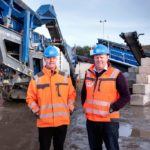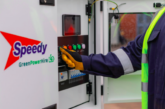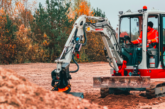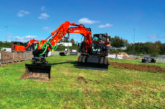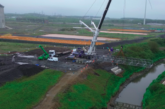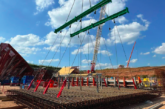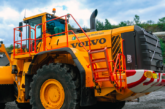East Midlands demolition contractor AR Demolition has continued investing in the future of its business with £800,000 of cutting-edge machinery for its aggregates recycling sister company.
Newly-installed at AR Aggregates’ urban quarry in Leicester are two pieces of kit from German manufacturer Kleeman: an MR 110 Z EVO 2 impact crusher and an MS 953 EVO screening plant.
Energy and fuel efficient, the new plant will improve productivity and continue to enhance AR Aggregates’ economy and safety performance.
The equipment will also enhance the company’s role in realising the value of recycled construction waste – aggregate arisings such as brick, concrete, tiles and glass. In 2018, AR Demolition recycled 94 per cent of all demolition waste arisings, 180,000 tonnes of which was reused on construction, infrastructure and civil engineering projects.
Richard Dolman, who founded the AR Demolition family of companies in 2007 alongside co-owner Andrew Thompson, said he was keen to further develop a business with sustainability at the forefront, not only in terms of plant performance but also to promote a genuinely circular economy in the construction industry.
“This investment in our own new equipment further demonstrates how a relatively small contractor can become a beacon of operational and environmental standards,” he said.
“We understand we have a valuable role to play in providing recycled materials to fulfil the demand for aggregates as the UK looks to invest in develop its infrastructure and housing stock.
“Indeed, recycling and repurposing of materials has never been higher on the social and political agenda. In the current climate it is therefore essential that all industries look at how they can make a real impact in avoiding sending materials to landfill and by reducing their carbon emissions.
“AR Demolition and AR Aggregates are proud of an environmental management strategy which targets zero landfill alongside robust environmental processes for pre-planning and on-site control, including site waste management plans that mean we can effectively eliminate, reuse, reduce and recycle all possible elements of construction, utility, and demolition arisings.”
The new impact crusher and screening plant are not the first investments in cutting-edge German machinery in the AR family.
In March 2018, AR Demolition, which is based in Carlton near Nuneaton, took delivery of three versatile, high-reach Kiesel machines, in a £1.5m investment.
Mr Dolman, who was recently elected Vice President of the Institute of Demolition Engineers, said he is keen for his industry to help develop new ways of thinking which can be adopted across the construction sector.
“Demolition is an industry which has a unique view on the construction methods of the past,” he said. “This, in turn, can help contractors like us critique the present and make important recommendations for the future, particularly where sustainability is concerned.
“Design for deconstruction would be the ideal going forward into the future. Most buildings we demolish were constructed using older building techniques and materials, whereas modern construction often uses techniques which will actually preclude recycling in the future.
“So while modern construction methods may aim for sustainability, they can be highly wasteful when they come to demolition, as they inevitably will at some point in time.
“I would therefore urge all involved in the construction process to consider the end of a building’s life, as well as its design for the time when it remains standing.”

